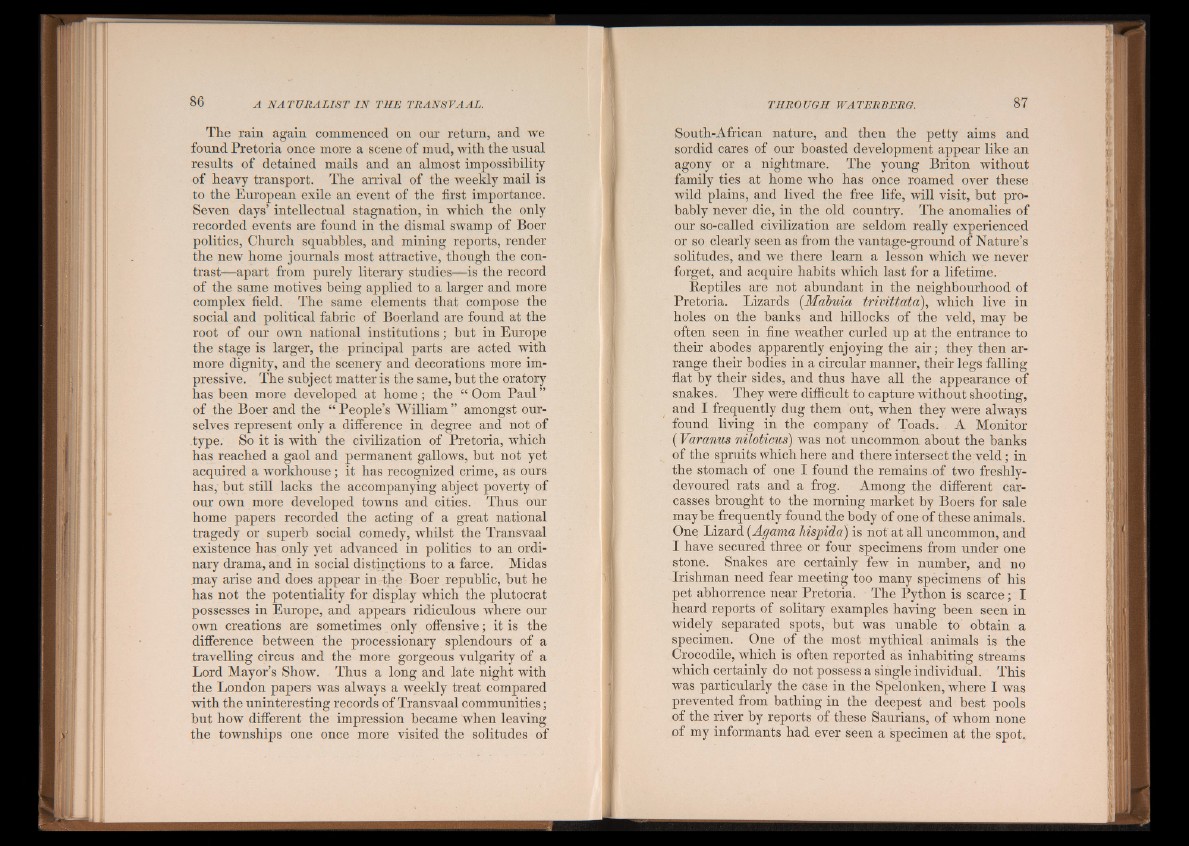
The rain again commenced on our return, and we
found Pretoria once more a scene of mud, with the usual
results of detained mails and an almost impossibility
of heavy transport. The arrival of the weekly mail is
to the European exile an event of the first importance.
Seven days’ intellectual stagnation, in which the only
recorded events are found in the dismal swamp of Boer
politics, Church squabbles, and mining reports, render
the new home journals most attractive, though the contrast—
apart from purely literary studies—is the record
of the same motives being applied to a larger and more
complex field. The same elements that compose the
social and political fabric of Boerland are found at the
root of our own national institutions; but in Europe
the stage is larger, the principal parts are acted with
more dignity, and the scenery and decorations more impressive.
The subject matter is the same, but the oratory
has been more developed at home; the “ Oom Paul ”
of the Boer and the “ People’s William ” amongst ourselves
represent only a difference in degree and not of
type. So it is with the civilization of Pretoria, which
has reached a gaol and permanent gallows, hut not yet
acquired a workhouse; it has recognized crime, as ours
has, but still lacks the accompanying abject poverty of
our own more developed towns and cities. Thus our
home papers recorded the acting of a great national
tragedy or superb social comedy, whilst the Transvaal
existence has only yet advanced in politics to an ordinary
drama, and in social distinctions to a farce. Midas
may arise and does appear in the Boer republic, hut he
has not the potentiality for display which the plutocrat
possesses in Europe, and appears ridiculous where our
own creations are sometimes only offensive; it is the
difference between the processionary splendours of a
travelling circus and the more gorgeous vulgarity of a
Lord Mayor’s Show. Thus a long and late night with
the London papers was always a weekly treat compared
with the uninteresting records of Transvaal communities;
but how different the impression became when leaving
the townships one once more visited the solitudes of
South-African nature, and then the petty aims and
sordid cares of our boasted development appear like an
agony or a nightmare. The young Briton without
family ties at home who has once roamed over these
wild plains, and lived the tree life, will visit, hut probably
never die, in the old country. The anomalies of
our so-called civilization are seldom really experienced
or so clearly seen as from the vantage-ground of Nature’s
solitudes, and we there learn a lesson which we never
forget, and acquire habits which last for a lifetime.
Keptiles are not abundant in the neighbourhood of
Pretoria. Lizards (Mabuia trivittata), which live in
holes on the banks and hillocks of the veld, may be
often seen in fine weather curled up at the entrance to
their abodes apparently enjoying the air; they then arrange
their bodies in a circular manner, their legs falling
flat by their sides, and thus have all the appearance of
snakes. They were difficult to capture without shooting,
and I frequently dug them out, when they were always
found living in the company of Toads. . A Monitor
(Varanus niloticus) was not uncommon about the banks
of the spruits which here and there intersect the veld; in
the stomach of one I found the remains of two freshly-
devoured rats and a frog. Among the different carcasses
brought to the morning market by Boers for sale
maybe frequently found the body of one of these animals.
One Lizard (Agama Mspida) is not at all uncommon, and
I have secured three or four specimens from under one
stone. Snakes are certainly few in number, and no
Irishman need fear meeting too many specimens of his
pet abhorrence near Pretoria. The Python is scarce; I
heard reports of solitary examples having been seen in
widely separated spots, but was unable to obtain a
specimen. One of the most mythical animals is the
Crocodile, which is often reported as inhabiting streams
which certainly do not possess a single individual. This
was particularly the case in the Spelonken, where I was
prevented from bathing in the deepest and best pools
of the river by reports of these Saurians, of whom none
of my informants had ever seen a specimen at the spot.